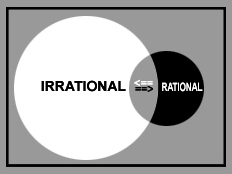Mathematics is not free of irrationality. But it seems to be the last discipline which is still able to integrate, to include, to control parts of the irrational. Physics has already given up.
Nevertheless, mathematics has problems. And these problems started at the same time as the problems of physics - with the difference I mentioned above.
With mathematics one can do almost everything - thus also nonsense.
With the problems I do not only mean the fundamental crisis, concerning the solution of which formalism, conventionalism and intuitionism opposed each other. Not only this problem has not been solved properly. But it has given another, an important insight: that there are undecidable questions within mathematics (cf. proof of Gödel). On the other hand, definitive proofs of non-contradiction have been given for wide areas of mathematics (cf. Hilbert, Genzen).
Logical considerations play an important role, among other things, in the construction of an antinomy-free set theory and in the general theory of proof. Pioneering work in the field of mathematical logic, which is closely related to the philosophy of mathematics, was done in the 19th century by Frege, in the 20th century by Russel and Whitehead.
I have drawn the undecidability I just spoke about into a diagram in the topic “rational/irrational” and called this diagram a “dynamic, i.e. historical diagram”. That must be allowed. I don’t have to follow guidelines when I want to illustrate something. This is what I meant when I said that “Venn is not a god for me”.The antinomies of set theory speak a clear language (best known example: “set of all sets” - it must, but must not contain itself), even if one has simply taken them out of set theory. Antinomies appear again and again, and it is the task of history (in this case: the history of science or epistemology) to solve them, to which also the history of philosophy can contribute. No theory can remain static; theories change with the time: that is history (time => change <=>history). There are also still undiscovered antinomies in set theory as in mathematics as a whole.
The bivalence principle (cf. “principium exclusi tertii” resp. “tertium non datur”) as the principle of bivalence of classical logic, according to which a statement must always be true or false, has been criticized for various reasons and logics have been designed in which it is not valid and in which there are more than two truth values.
There are logic systems which use three and more, even infinite truth values. One speaks of a multivalued logic. Antinomies appear again and again, and it is the task of history (in this case: the history of science or epistemology) to solve them, to which also the history of philosophy can contribute. No theory can remain static, they change with the time: that is history (time => change <=> history). There are also still undiscovered antinomies in set theory as in mathematics as a whole.
According to Gödel’s result, one must presuppose an infinite number of truth values, e.g. in a semantics of truth values, which exactly marks out the principles as valid, which are derivable in an intuitionistic calculus. A descriptive interpretation succeeds in the framework of the possible-worlds semantics. The intuitionistic logic is a system of formal logic, which is supposed to satisfy the criticism (!) of the mathematical intuitionists against the modes of reasoning of classical mathematics.
One knows that there are statements which are undecidable. I have pointed to this - and to the fact that the undecidability is changed by the time, i.e. by the change and thus by the history, e.g. its extent is reduced or increased.
